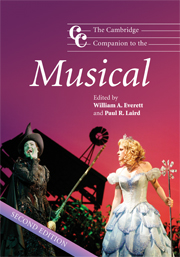Book contents
- Frontmatter
- Part I Adaptations and transformations: before 1940
- Part II Maturations and formulations: 1940–1970
- 7 ‘We said we wouldn't look back’: British musical theatre, 1935–1960
- 8 The coming of the musical play: Rodgers and Hammerstein
- 9 The successors of Rodgers and Hammerstein from the 1940s to the 1960s
- 10 Musical sophistication on Broadway: Kurt Weill and Leonard Bernstein
- Part III Evolutions and integrations: after 1970
- Part IV Legacies and transformations
- Notes
- Select bibliography
- Index
10 - Musical sophistication on Broadway: Kurt Weill and Leonard Bernstein
from Part II - Maturations and formulations: 1940–1970
Published online by Cambridge University Press: 28 September 2011
- Frontmatter
- Part I Adaptations and transformations: before 1940
- Part II Maturations and formulations: 1940–1970
- 7 ‘We said we wouldn't look back’: British musical theatre, 1935–1960
- 8 The coming of the musical play: Rodgers and Hammerstein
- 9 The successors of Rodgers and Hammerstein from the 1940s to the 1960s
- 10 Musical sophistication on Broadway: Kurt Weill and Leonard Bernstein
- Part III Evolutions and integrations: after 1970
- Part IV Legacies and transformations
- Notes
- Select bibliography
- Index
Summary
What a marvellous sight, looking out the window during the rehearsal and seeing the students sitting around listening, some even singing the ‘Moritat’ [‘Mack the Knife’] already. I don’t think I will ever hear the music played as beautifully as when Lenny did it. It was so magical and effortless.
lotte lenyaSo recalled Kurt Weill's widow about the performance of The Threepenny Opera at Brandeis University's Festival of the Creative Arts on 14 June 1952. The concert featured Bertolt Brecht and Weill's 1928 work, Die Dreigroschenoper, in an English translation by Marc Blitzstein, who also served as narrator. Nearly five thousand people filled the new Adolph Ullman Amphitheatre, and Lenya stopped the concert cold with her rendition of ‘Pirate Jenny’ (see Plate 15). The following year, a fully staged Threepenny Opera opened at the Theater de Lys in Greenwich Village. It ran for ninety-six performances, but closed because of a previous booking at the theatre. Reopening the following season, The Threepenny Opera ran for 2,611 performances to become (for a time) the longest-running musical in American history. Lenya won the Tony for best featured actress in a musical, and the production garnered a special Tony, highly unusual for an off-Broadway show.
The conductor for the 1952 concert performance of The Threepenny Opera had been Leonard Bernstein, then a Brandeis faculty member. The concert proved a turning point for both Weill's and Bernstein's careers. Weill, who died in 1950 at the age of fifty, had fled Germany in 1933 and emigrated to the United States two years later. The Brandeis concert ushered in the so-called ‘Weill renaissance’ and the rediscovery of his German works by American audiences. The Threepenny Opera's ‘Mack the Knife’, in renditions by Louis Armstrong, Dick Hyman, Bobby Darin, Frank Sinatra and Ella Fitzgerald, successively climbed the hit parade to sell over ten million records.
- Type
- Chapter
- Information
- The Cambridge Companion to the Musical , pp. 190 - 202Publisher: Cambridge University PressPrint publication year: 2008



